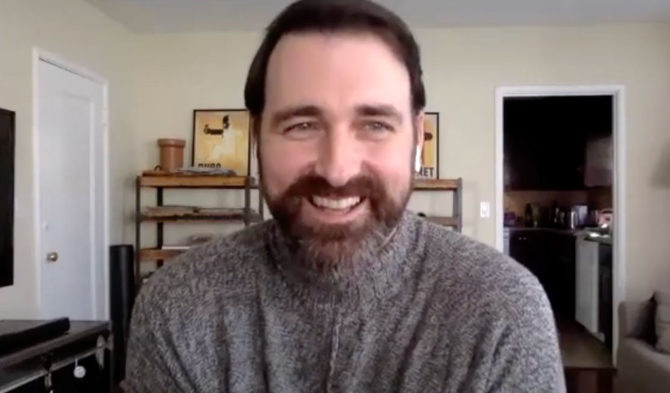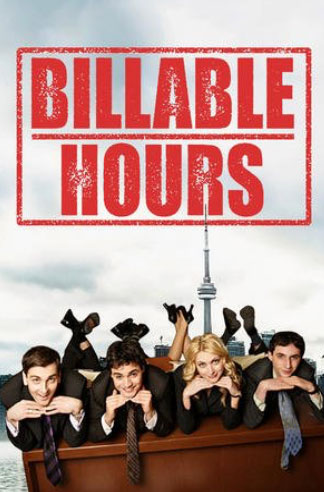Writing Professor Brings Exclusive Podcast with Industry Friends to the TFSO Classroom
From Big Bang Theory and Baroness von Sketch, to Schitt’s Creek and Cobra Kai – Toronto Film School Online professor Brandon Firla’s new podcast takes an insider’s look into the writing rooms of some of the funniest shows on TV.
Drawing from the extensive list of industry friends he’s amassed over his 20-year acting career, Firla’s nameless podcast is available exclusively to the Writing for Film & TV students in his sitcom and comedy writing courses.
“It’s all people I’ve done shows with in Toronto either on-camera or on-stage – mostly writers who’ve been in the writing rooms of the shows I was on camera for,” said Firla, who’s acting resume includes series regular roles on Suits, Little Mosque, and Billable Hours, as well as guest spots on Modern Family, Pretty Little Liars and Carter, among others.
“I thought, for students, it could be really valuable to see into the creative worlds of some of people I know who are actively working on shows today.”
Now up to six episodes, Firla’s podcast are specially catered to each of the four courses he’s currently teaching.

For students in his 310 Comedy Writing class, which delves into late night and sketch shows, he’s recorded podcasts with Allana Harkin, a co-producer on Full Frontal with Sam Bee, and Jennifer Whalen, one of the co-creators, showrunners and stars of the Baroness Von Sketch Show.
For his 410 and 510 Sitcom Writing classes, Firla’s had conversations with writer/executive producer Jason Belleville, whose most recent credits include Cobra Kai, Brockmire and The Unicorn, and Emmy-winning executive producer Kurt Smeaton, whose writing resume includes episodes of Schitt’s Creek, Children Ruin Everything and Kim’s Convenience.
Lastly, Firla has welcomed Jennica Harper, the showrunner, executive producer and co-creator of Jann and Tara Treacy, a casting director who’s worked on many Chuck Lorre shows, including Big Bang Theory, Two and a Half Men and Disjointed, for students in his 610 Sitcom Showrunning course.
“The format I try to follow is that it always starts with how my guest got started, what their first gig was, and then I get into the process of what they’re working on now or how they develop stories,” Firla said of his interview formula, which includes questions submitted by his students.
“I’m really happy that I just randomly decided to do these podcasts as kind of a supplemental, bonus materials for my classes. And I’m excited about keeping it as a teaching tool and not a public podcast, because then I can focus more on the details and the craft, as opposed to trying to be entertaining.”
So far, Firla’s podcast has proven an enlightening exercise, not just for his screenwriting students, but for himself as well, he said, noting that his most recent interview with Treacy was an especially eye-opening one.

“When I was talking to Tara about casting, it was the first time I’d thought about casting from the other side, as opposed to walking in as an actor auditioning,” he said about learning more details about casting directors’ complex dealings with producers and networks.
“It was fascinating, because as an actor, you think it’s just about ‘Do you like me or not?’ You don’t consider all the other amount of work and involvement that goes into casting, which really is one of the most important parts in the entire creation of a show.”
While Firla is probably most recognized for his acting accomplishments, he’s also an award-winning stage and screenwriter himself – a talent he didn’t begin to hone, he admits, until his early acting career failed to take off as quickly as he hoped.
“I tell my students all the time, I started writing because I wasn’t getting hired as an actor,” he laughed. “I needed the creative outlet and that’s how I got my foot in the door.”
Born and raised in Calgary, Firla said he caught the acting bug at a very young age – performing in all of his school plays growing up, then going on to study under British-Canadian improvisational theatre pioneer Keith Johnstone at the University of Calgary.
From there, Firla earned himself a scholarship to study musical theatre in New York, then finished his training in England, at the London Academy of Music & Dramatic Art, where he shared the stage with none other than Doctor Strange himself.
“I had the great misfortune of being classmates with Benedict Cumberbatch, who set the bar so high, it’s impossible to hit the heights he’s climbed,” Firla laughed.
“Studying theatre in London was kind of Mt. Olympus – the apex mountain of actor training. Not just the school itself, but just the culture there and being able to see people performing at such a high level when you go to a west-end show or to the Barbican Centre or the National Theatre…It was humbling and the most amazing learning experience, just being in that environment.”
It was upon his return to Canada, after two unsuccessful auditions for the Shaw Festival Theatre and Stratford Festival, that Firla banded together with his animator/stand-up comedian brother, Kurt Firla, to write some of their own material.
At Kurt’s urging, the duo formed a Martin & Lewis-like throwback double act called The Rumoli Brothers.
“Our first play, called Last Laugh, was about a comedy act in the ’50s – kind of like a Hope & Crosby movie that told the story of this act’s succession through various night clubs and into Hollywood,” he explained.
“From there, we wanted to do bigger projects – not necessarily be in them, but to write them and produce them and direct them.”
SARSical – a musical about the SARS outbreak in Toronto – was the pair’s first full-length play. It premiered at the Fringe Festival, and was remounted at Toronto’s Factory Theatre, earning several local theatre accolades, including a 2007 Dora Award nomination for Best New Play or Musical in the Independent Theatre category.
Their follow-up production, An Inconvenient Musical, was similarly well received, and segued into opportunities for Firla and his brother to do a talk show for the Fringe Theatre Festival and form a partnership with Second City.

At about the same time, Firla also landed his first series regular role on Billable Hours – the brainchild of Toronto Film School’s Writing for Film & TV Program Coordinator, Adam Till.
“From that point on, one role just kind of lead to another, and over the years, Adam and I began working together with (Billable Hours star) Fabrizio Filippo and we got several development deals and even sold a script to Fox,” he said.
“Once I got my foot in the door, I was very lucky to be in a position where the head of development at CBC says, ‘Let’s have a meeting soon. Come up with two or three ideas for a show for yourself.’ I mean, there’s a massive gap between that and getting a show on the air, but the fact that I’m given the opportunity to think of ideas and pitch them and spin that wheel – that’s kind of where I’m at now.”
That position is also one that, to Firla’s surprise, makes him uniquely qualified to teach screenwriting at Toronto Film School – a new role he just took up shortly before the COVID-19 pandemic struck last year.
“Teaching is definitely not something I ever imagined I would be doing. But it’s funny, because in hindsight, I’m strangely prepared and qualified for this, because of the opportunities I’ve had developing my own stuff. So, I just took the leap, figured it out and had some laughs along the way,” he said.
“I see my role more as a collaborator. I’m not really going to be able to teach you how to write, but I am going to show you the format and the structure, and from that point on, I’ll be a voice in your ear pitching ideas and making suggestions. It’s been fantastic.”


